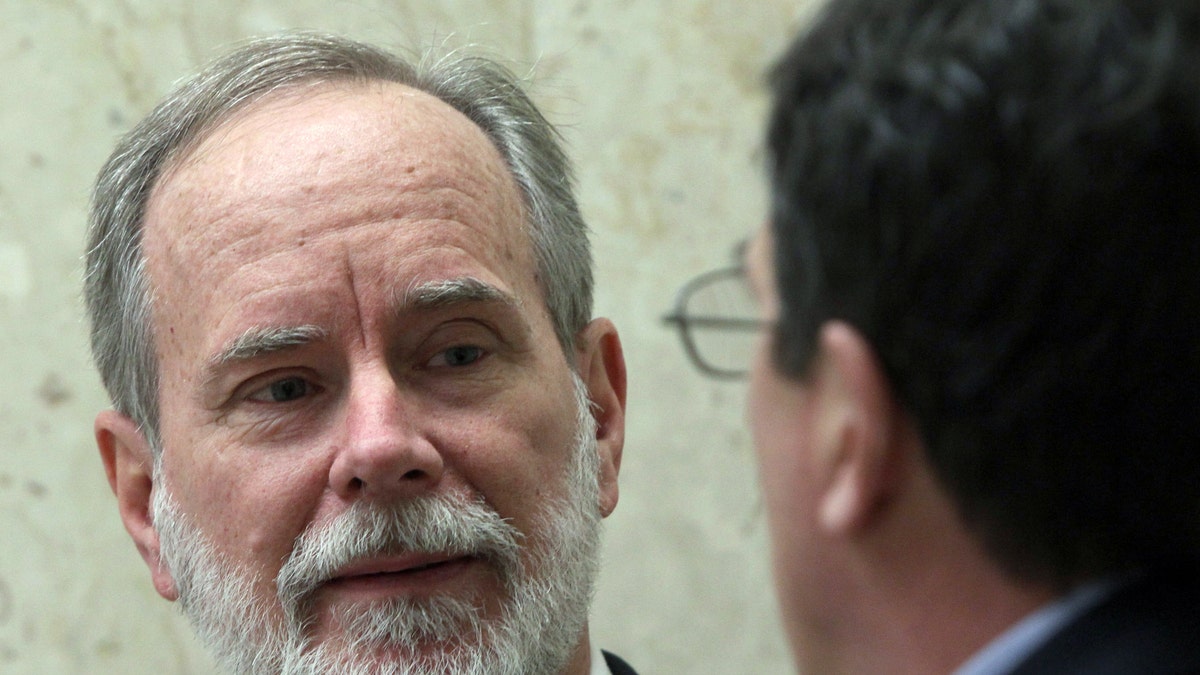
March 7, 2012: David Coppedge, left, is shown outside Los Angeles Superior Court with his attorney, William Becker. (AP)
LOS ANGELES – NASA's Jet Propulsion Laboratory has landed robotic explorers on the surface of Mars, sent probes to outer planets and operates a worldwide network of antennas that communicates with interplanetary spacecraft.
Its latest mission is defending itself in a workplace lawsuit filed by a former computer specialist who claims he was demoted -- and then let go -- for promoting his views on intelligent design, the belief that a higher power must have had a hand in creation because life is too complex to have developed through evolution alone.
David Coppedge, who worked as a "team lead" on the Cassini mission exploring Saturn and its many moons, alleges that he was discriminated against because he engaged his co-workers in conversations about intelligent design and handed out DVDs on the idea while at work. Coppedge lost his "team lead" title in 2009 and was let go last year after 15 years on the mission.
Opening statements are expected to begin Monday in Los Angeles Superior Court after two years of legal wrangling in a case that has generated interest among supporters of intelligent design. The Alliance Defense Fund, a Christian civil rights group, and the Discovery Institute, a proponent of intelligent design, are both supporting Coppedge's case.
"It's part of a pattern. There is basically a war on anyone who dissents from Darwin and we've seen that for several years," said John West, associate director of Center for Science and Culture at the Seattle-based Discovery Institute. "This is free speech, freedom of conscience 101."
[pullquote]
The National Center for Science Education, which rejects intelligent design as thinly veiled creationism, is also watching the case and has posted all the legal filings on its website.
"It would be unfortunate if the court took what seems to be a fairly straightforward employment law case and allowed it to become this tangled mess of trying to adjudicate scientific matters," said Josh Rosenau, NCSE's programs and policy director. "It looks like a pretty straightforward case. The mission that he was working on was winding down and he was laid off."
Coppedge's attorney, William Becker, says his client was singled out by his bosses because they perceived his belief in intelligent design to be religious. Coppedge had a reputation around JPL as an evangelical Christian and other interactions with co-workers led some to label him as a Christian conservative, Becker said.
In the lawsuit, Coppedge says he believes other things also led to his demotion, including his support for a state ballot measure that sought to define marriage as limited to heterosexual couples and his request to rename the annual holiday party a "Christmas party."
"David had this reputation for being a Christian, for being a practicing one. He did not go around evangelizing or proselytizing. But if he found out that someone was a Christian he would say, `Oh that's interesting, what denomination are you?"' Becker said.
"He's not apologizing for who he is. He's an evangelical Christian."
In an emailed statement, JPL dismissed Coppedge's claims. In court papers, lawyers for the California Institute of Technology, which manages JPL for NASA, said Coppedge received a written warning because his co-workers complained of harassment. They also said Coppedge lost his "team lead" status because of ongoing conflicts with others.
Caltech lawyers contend Coppedge was one of two Cassini technicians and among 246 JPL employees let go last year due to planned budget cuts.
While the case has attracted interest because of the controversial nature of intelligent design, it is at its heart a straightforward discrimination case, said Eugene Volokh, a professor of First Amendment law at the University of California, Los Angeles School of Law.
"The question is whether the plaintiff was fired simply because he was wasting people's time and bothering them in ways that would have led him to being fired regardless of whether it was about religion or whether he was treated worse based on the religiosity of his beliefs," said Volokh. "If he can show that, then he's got a good case."
Coppedge, who began working for JPL as a contractor in 1996 and was hired in 2003, is active in the intelligent design sphere and runs a website that interprets scientific discoveries through the lens of intelligent design. His father authored an anti-evolution book and founded a Christian outreach group.
He is also a board member for Illustra Media, a company that produces video documentaries examining the scientific evidence for intelligent design. The company produces the videos that Coppedge was handing out to co-workers, said Becker, his attorney.
His main duties at JPL were to maintain computer networks and troubleshoot technical problems for the mission. In 2000, he was named "team lead," serving as a liaison between technicians and managers for nearly a decade before being demoted in 2009.
He sued in April 2010 alleging religious discrimination, retaliation and harassment and amended his suit to include wrongful termination after losing his job last year.
Coppedge is seeking attorney's fees and costs, damages for wrongful termination and a statement from the judge that his rights were violated, said Becker.